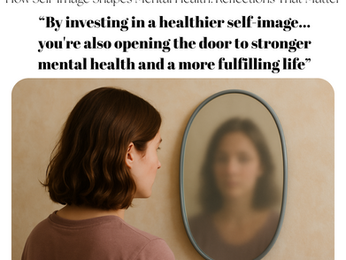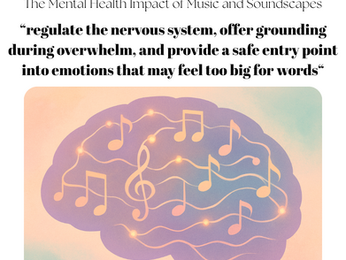Search


The Psychology of Waiting
Waiting can feel prickly, noisy, and strangely exhausting. A five minute delay can feel like fifty, especially when it touches something important such as health results, school feedback, a reply from someone you care about, or an application that matters. If you have ever wondered why waiting feels bigger than the clock says, you are not alone.
Deborah Marks
Sep 26, 20254 min read


Move Your Mood: How Physical Activity Supports Mental Health
We often think of exercise as a body goal. In therapy, I see it as a nervous system tool. Regular physical activity signals safety to the brain, steadies the stress response, and builds a felt sense of capability. You do not need a gym membership or perfect routines. Small, repeatable bouts of movement can shift mood, improve clarity, and support sleep.
Deborah Marks
Sep 24, 20253 min read


Why “Doing Nothing” is a Powerful Mental Health Tool
In a world that praises productivity and busyness, the idea of “doing nothing” can feel uncomfortable or even wrong. Many people associate rest with laziness, fearing that slowing down means falling behind. But from a mental health perspective, the practice of intentional rest is not only beneficial, it’s essential.
Deborah Marks
Sep 17, 20252 min read


Decision-Making and Intuition: Balancing Gut Feelings With Rational Thought
In life, we are constantly faced with decisions: big and small. From choosing what to eat for lunch to making career or relationship choices, decision-making is woven into every part of our daily experience. Yet many people wrestle with the question: Should I trust my gut feeling, or should I weigh the logic and facts?
Deborah Marks
Sep 15, 20252 min read


The Psychology of Values: Unlocking Better Mental Health
Every person has a unique set of values that guide their choices, shape their relationships, and influence their sense of purpose. These values are not just abstract beliefs; they serve as the foundation of our wellbeing. When our daily lives align with what we value most, we tend to feel more balanced, fulfilled, and mentally healthy. When there is a disconnect, however, stress, anxiety, and dissatisfaction often arise.
Deborah Marks
Sep 12, 20253 min read


The Psychology of Nostalgia: Why We Crave the Past in Stressful Times
Nostalgia often sneaks up on us in surprising ways. It might be a song from our teenage years, a scent that reminds us of childhood, or a photo that instantly transports us to a simpler time. In moments of stress or uncertainty, many people find themselves craving these comforting glimpses of the past. But why is nostalgia so powerful, and how can it be used therapeutically to support mental health?
Deborah Marks
Sep 11, 20252 min read


Decision Fatigue: Why Small Choices Can Feel Overwhelming
Do you ever feel drained just from deciding what to wear, what to eat, or which task to start first? This isn’t just stress - it’s something called decision fatigue. Our brains are wired to make choices all day long, but the more decisions we make, the less mental energy we have left. Over time, even the smallest choices can feel overwhelming.
Deborah Marks
Sep 10, 20252 min read


Community and Mental Health
In a world where many people feel increasingly isolated, the role of community in supporting mental health has never been more important. Whether it’s family, friends, local groups, or professional networks, the sense of belonging and connection that community provides can act as a powerful buffer against stress, anxiety, and depression.
Deborah Marks
Sep 9, 20252 min read


How Self-Image Shapes Mental Health
The way you see yourself influences almost every aspect of your life. Self-image is more than just how you look in the mirror; it’s the collection of beliefs, feelings, and assumptions you carry about who you are. A critical or distorted self-image can quietly chip away at your confidence, contributing to anxiety, depression, and relationship struggles. By contrast, nurturing a kinder and more balanced self-view supports resilience, self-esteem, and emotional wellbeing.
Deborah Marks
Sep 8, 20252 min read


The Power of Understanding Your Emotions
Many people move through their day without pausing to notice how they truly feel. Between work, family, and constant distractions, emotions can get buried or brushed aside. Yet emotions are powerful signals. They tell us what we need, guide our decisions, and shape our relationships.
Deborah Marks
Sep 5, 20253 min read


Guilt and Mental Health
Guilt is one of the most powerful emotions we experience. At its core, it arises when we believe we have done something wrong, let someone down, or failed to meet our own standards. In small doses, guilt can be constructive, guiding us to repair relationships or make better choices. However, when guilt becomes excessive, misplaced, or chronic, it can weigh heavily on our mental health.
Deborah Marks
Sep 4, 20253 min read


Understanding PTSD
PTSD is a mental health condition that develops after exposure to trauma. While many people experience temporary distress after a traumatic event, PTSD occurs when these symptoms persist for more than a month and significantly interfere with daily life
Deborah Marks
Sep 3, 20252 min read


The Intersection of Climate Anxiety and Mental Health
Australia is no stranger to extreme weather. In recent years, bushfires, floods, and prolonged droughts have left lasting scars on communities and individuals alike. Beyond the physical destruction, these events are fuelling a growing phenomenon known as climate anxiety, a sense of fear, hopelessness, or overwhelm about the state of our planet and its future.
Deborah Marks
Sep 2, 20252 min read


Micro-Moments of Connection: Small Interactions That Improve Wellbeing
It’s human nature to underestimate the power of small gestures, but their impact on mental health is profound. Each positive interaction helps release oxytocin, the hormone that fosters trust and reduces stress. In a world where loneliness and disconnection are rising concerns, even a passing moment of connection can help lower anxiety, lift mood, and remind us that we’re not alone.
Deborah Marks
Sep 1, 20253 min read


Moral Injury: Beyond Trauma in Helping Professions
When we talk about trauma in healthcare, social work, and first responder professions, the focus is often on post-traumatic stress disorder (PTSD). But there is another, quieter wound that doesn’t always get the recognition it deserves: moral injury.
Deborah Marks
Aug 29, 20253 min read


The Mental Health Impact of Music and Soundscapes: Linking Neuroscience with Therapy Practice
Think back to a time when a song gave you goosebumps, or the sound of waves instantly calmed your mind. Music and soundscapes have a profound ability to shape our emotions, focus, and even our physical state. But this isn’t just a pleasant coincidence; neuroscience shows us that sound directly influences the brain in ways that can support healing and emotional wellbeing.
Deborah Marks
Aug 28, 20253 min read


The Rise of “Toxic Positivity”: When Good Vibes Become Harmful
In today’s culture of Instagram quotes, TikTok trends, and quick-fix self-help advice, positivity is often portrayed as the cure for everything. While optimism has many proven benefits, there is a growing problem when positivity becomes forced, dismissive, or used to suppress genuine emotions.
Deborah Marks
Aug 25, 20253 min read


Understanding Attachment Styles in Relationships: How Therapy Can Help
Our relationships are deeply influenced by the way we connect with others, often shaped by experiences from early childhood. This connection pattern, known as our attachment style, can profoundly impact romantic relationships, friendships, and family dynamics.
Deborah Marks
Aug 21, 20252 min read


Understanding and Addressing Generational Trauma: Insights for Mental Health Professionals
For mental health professionals, understanding the nuances of generational trauma is essential for supporting clients in recognising patterns, fostering resilience, and promoting healing across generations.
Deborah Marks
Aug 20, 20252 min read


Impacts of Hormones on Mental Health
Hormones are chemical messengers that influence nearly every system in the body, including the brain. While they are most often associated with physical functions such as growth, metabolism, or reproduction, hormones also play a significant role in shaping our moods, emotions, and mental wellbeing. Understanding this connection can help us better manage stress, recognise changes in our mental health, and seek support when needed.
Deborah Marks
Aug 19, 20253 min read